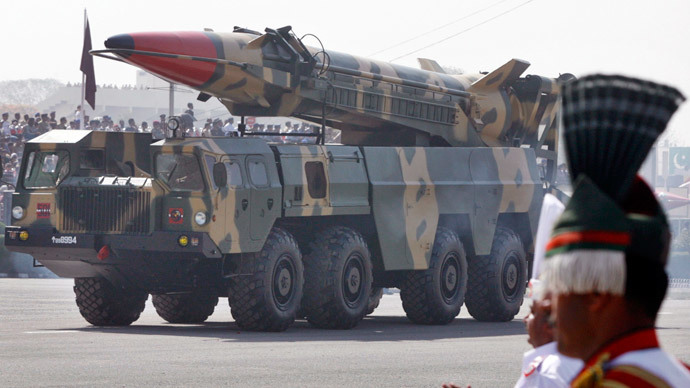"For saudierne er tiden kommet," fortalte en tidligere amerikansk forsvars official til avisen The Sunday Times. "Der har været en længere stående aftale med pakistanerne og huset Saud har nu gjort en strategisk beslutning i at ville gå videre (med aftalen)."
Comment: Et godt spørgsmål ville være hvorfor nu? Hvad er ændret på det international skakbrædt der gør at den saudieske elite synes de har brug for kernevåben.
Ifølge rapporten, har ingen egentlig våben transaktion endnu fundet sted, men "saudierne mener hvad de siger og gør hvad de siger," fortæller kilden antageligvis.
#Iran insists #Israel 'give up the bomb' as Tehran seeks nuclear-free Middle East http://t.co/toHPgMxWv7 pic.twitter.com/pNbRX1vtMv— RT (@RT_com) April 27, 2015Kommentar: Følgende artikel er ikke videre blevet oversat til dansk. Vi undskylder at vi ikke er istand til at oversætte alle artikler på vores netavis, men håber at du har forståelse for at vores lille stab af redaktører og oversættere gør deres bedste for at viderebringe til dig de vigtigste af "tidens tegn", som vi observerer dem. Hvis du har lyst til at se alle detaljer af denne artikel eller at støtte vores bestræbelser med dine egne oversættelser eller forslag, så tøv ikke med at skrive til sott_da@sott.net
The report comes a month ahead of a meeting between Tehran and the P5+1 group to finalize a deal, which would lift sanctions from Iran in exchange for making its nuclear program more transparent and restricted. Key US allies in the Middle East, Israel and Saudi Arabia, are objecting to the deal, saying it would ultimately allow Iran to acquire nuclear weapons.
Reports of Saudi Arabia getting nukes aren't new. In November 2013, BBC's Newsnight reported on the alleged nuclear sharing agreement between Saudi Arabia and Pakistan.
The program cited Amos Yadlin, a former head of Israeli military intelligence, telling a conference in Sweden that if Iran got the bomb, "the Saudis will not wait one month. They already paid for the bomb, they will go to Pakistan and bring what they need to bring."
The speculation came just as nuclear talks between Iran and the P5+1 were showing progress in Geneva.
Some experts, however, doubted that the supposed nuclear arming by Saudi Arabia was as simple as calling in the debt.
"I doubt that Pakistan is ready to send nuclear weapons to Saudi Arabia," Mark Fitzpatrick, a non-proliferation expert with the International Institute for Strategic Studies,told the Guardian at the time.
"Pakistan's reputation suffered greatly the last time they assisted other countries with nuclear weapons technology (i.e., the sales by [Pakistani nuclear project chief] A.Q. Khan, with some governmental support or at least acquiescence, to North Korea, Iran and Libya). Pakistan knows that transferring nuclear weapons to Saudi Arabia would also incur huge diplomatic and reputational costs."
The potential of a nuclear arms race in the Middle East triggered by the Iran deal is one of the argument critics use to denigrate the talks. At the moment there are several countries in the region known or believed to have nuclear weapons.
Pakistan has a stockpile of 80 to 120 warheads designed to counterbalance India's arsenal, while Turkey hosts NATO nuclear weapons. Israel is said to have a stockpile, although it has never officially confirmed this.
Several other nations have civilian nuclear programs, including Iran, Egypt and UAE.




Kommentar: Det er interessant at der endnu ikke har været noget ramaskrig fra Vesten, nærmest ikke et pip fra USA. Igen ser vi at sagen aldrig er som medierne forfremmer dem, men det at ville opnå kernevåben (som masseødelæggelsesvåbnene i Irak) er udelukkende et banner regeringer bruger til at underbygge deres seneste trang til at invadere og sprede kaos.